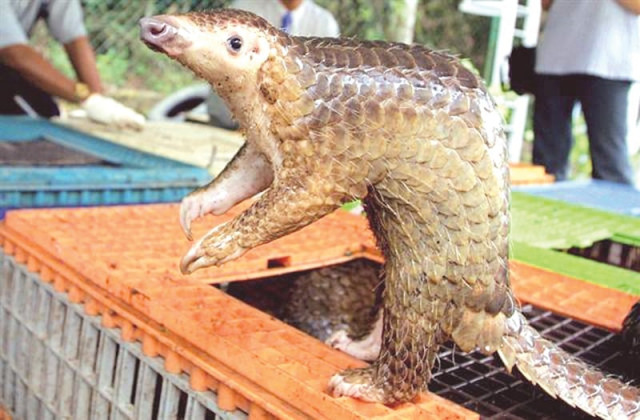
Hunting down pangolins is terribly easy. All the poachers have to do is send trained sniffer dogs to track them.
Once they sense a predator approaching, the pangolin curls up into a ball to present its harder outside shell to the dogs.
By this time, the poachers walk up to the animal, pick it up and put it in a sack.

For those who cannot afford sniffer dogs, the easier way is to use pungent-smelling pills that force the pangolins to come out of their holes. The bags that cover the holes simply trap the pangolins.
According to Azad Jammu and Kashmir’s wildlife department official Sikandar Ali, the ease with which poachers trap this endangered species has led to a lucrative illegal trade. The Indian pangolin, leopard geckos and black and brown scorpions are the main victims of this brutal trend of hunting and poaching. The Indian pangolin is listed as an endangered species in the Convention of International Trade in Endangered Species of Wild Fauna and Flora list. That does little to prevent the traders and the poachers.
Initially, it was just the chunggars [the slum dwellers] that hunted the pangolins, earning themselves anywhere between Rs8,000 and Rs12,000 for each catch. However, the price has tripled since then, and pangolins can fetch up to Rs35,000. The price is now enticing enough for the villagers to join in with the chunggars in poaching the pangolins, decreasing its numbers at an alarming rate.

Once caught, the pangolin is killed immediately; its trade is prohibited according to national and international laws and sneaking its scales and meat across borders is much easier than sneaking the animal alive. According to Ali, pangolins are not killed humanely, as the easiest way to separate the scales from the body is to dip the animal, alive, into a boiling cauldron of water.
The scales are used in traditional Chinese medicines and pangolin meat fetches around $200 per pound. In April, a whopping 145kg of pangolin scales were confiscated by Customs officials at the Benazir Bhutto Shaheed Airport Islamabad from the luggage of two Chinese nationals who were on their way to Hong Kong.
However, while trade of pangolins is rampant, the trade of black scorpion is much more obscure now due to the decrease in scorpion population. Some villagers even say ‘scorpion collecting’ is the stuff of myths and that it is no longer a viable profession.
While hunting scorpions may not be viable, breeding them still is. With the promise of a bumper pay at the end of it too good to turn down, scorpions are now being bred in mud-filled boxes and enclosures. The scorpions are fed fresh liver and dry animal dung in order to keep them alive and healthy.
The wildlife department claims to have recently seized a six-kg consignment of black and brown scorpions, and while they managed to arrest the scorpion sellers, they were unable to get to the buyer.

One of the arrested sellers was a small-time poultry and fish shopkeeper at Mangla Bazaar, who bought the scorpions from local poachers. These poachers also include women and children but with the passage of time and the black scorpions almost gone, the scorpion-catchers are slowly dying out.

In a desperate attempt to earn a final payday, scorpion-catchers have become grave-diggers, excavating old graves in Mirpur.
The scorpions are considered delicacies in a few countries and black scorpion venom is reportedly used to make experimental drugs to treat cancer and AIDS.
The illegal market has now taken to social media, with various advertisements of the sale and purchase of wild arachnids, reptiles and mammals.
The roots of poaching and illegal trade of endangered animals are worryingly deep in AJK and national and international action is required if the scourge is to be countered.
Published in The Express Tribune, October 10th, 2014.


















COMMENTS
Comments are moderated and generally will be posted if they are on-topic and not abusive.
For more information, please see our Comments FAQ